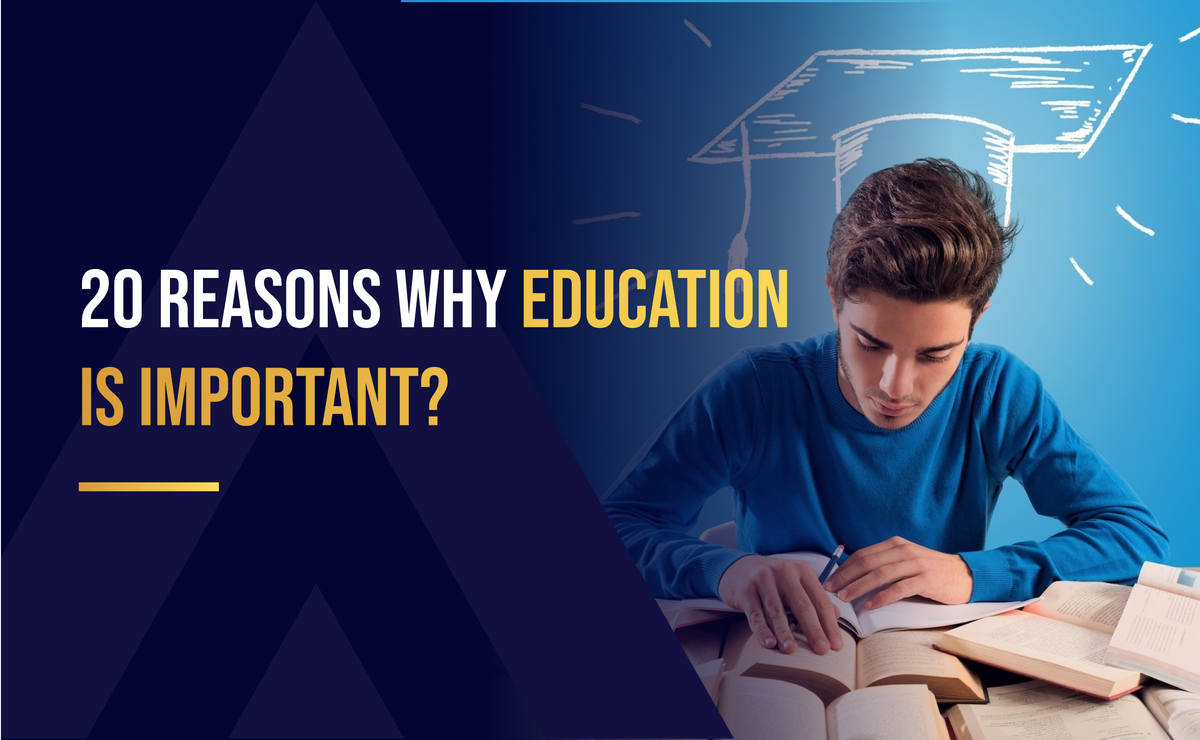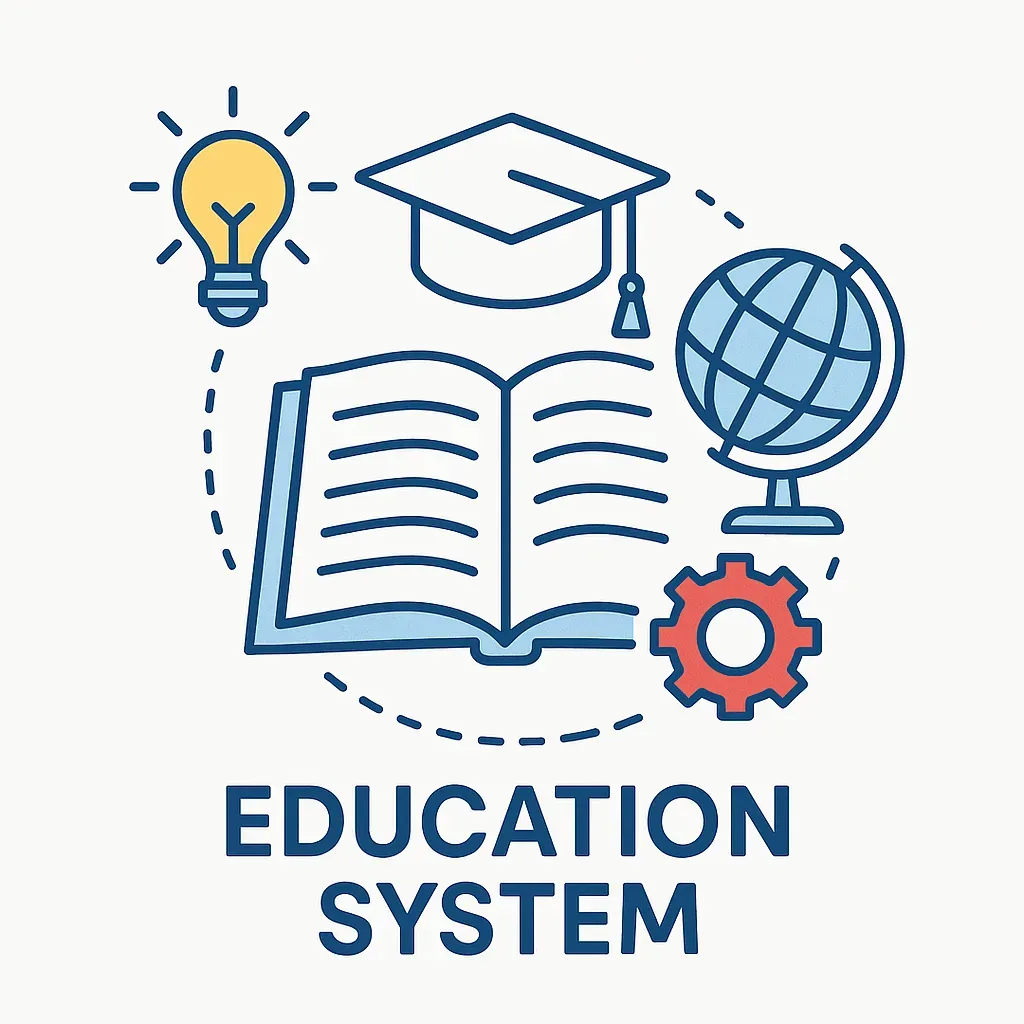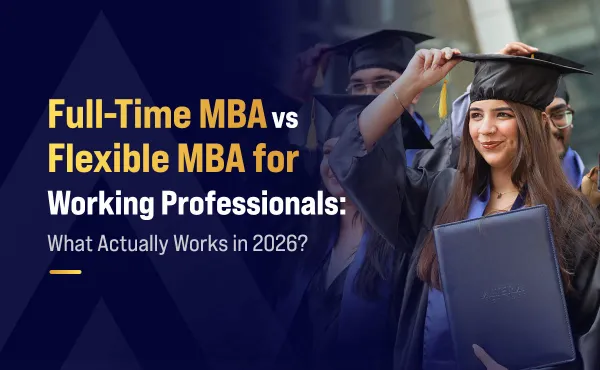20 Reasons Why Education Is Important?

Academics and philosophers have defined education in various ways throughout the ages. A prominent definition is that of Carter Good, an educational researcher, who in 1959 defined education as the process of making known to every generation the systematized knowledge of the past.
This quote defines education as the transmission of knowledge from one generation to the next, ensuring that human knowledge and development continue. Therefore, education is one of the most powerful tools for changing people and communities.
This article explores 20 compelling reasons why education is crucial and its impact on both individual and collective success.
Understanding why education matters is one thing—experiencing its impact is another. At Altera, we focus on bringing these ideals to life by helping students learn with clarity, grow with confidence, and step into careers with purpose. If you're curious about how our programs bring these 20 reasons to life, explore more on our homepage.
What is Education?

Education in a broader sense refers to the whole process of nurturing the mind, body, and character of an individual by imparting to them knowledge, skills, values, and culture. It does not restrict itself to school education, but is a lifelong learning process achieved through communication with family, peers, communities, and global networks.
Education helps people realize their full potential, whether it involves understanding scientific principles or learning a new language. It is the foundation of individual and professional achievement as it encourages minds to be innovative, creative, and to contribute significantly to society.
Based on the various viewpoints of scholars and political activists, education can be defined as:
- A Tool for Empowerment and Change: Nelson Mandela once said, "Education is the greatest weapon that you can utilize to transform the world. This brings out education as a modernizing aspect that can destroy poverty chains, empower people, and promote societal development.
- A Progressive Development Process: Georg Wilhelm Friedrich Hegel, a German philosopher regarded as an icon of modern Western philosophy, considered education to be a progressive path to human perfection, leading to an early stage of self-conscious freedom through discipline and hard work.
Similarly, many influential people throughout history have recognized and emphasized the importance of education for society. And now that society has evolved, so has the role of education in our lives—shifting from traditional modes of education to inclusive, technology-driven modern frameworks that empower individuals to thrive in the 21st century.

What is the Purpose of Education?
Education is used differently when it comes to personal objectives and social requirements. It is also so much more than just academic performance. It is, fundamentally, about empowering individuals to find their ways within the complexity of life and developing a sense of responsibility to society and global problems.
As much as personal success is a side effect of education and a strong incentive to pursue it, it can also be used to raise communities up the ladder, develop empathy, and drive innovation. Let's understand the key purposes of education in detail:
- Education is a pathway to gaining knowledge and mastering various subjects that fuel intellectual growth and development. It enables individuals to explore specialized fields of the modern world and find answers to previously uncharted questions.
- In addition to academics, education plays a crucial role in shaping a student's personality and self-awareness. It helps people identify their strengths, address their weaknesses, and boost their self-confidence. It promotes balanced development by participating in team tasks, competitions, and after-school activities, making students grow into confident and polite individuals.
- A key goal of education is to prepare learners to thrive in today’s dynamic job market. Career opportunities are becoming increasingly specialized and complex in nature; hence, academic pursuits of all kinds—whether at the undergraduate or postgraduate level—are also evolving to address these complexities.
- Education fosters an awareness of the world and its citizens, preparing students to address some of the most pressing issues of our time, such as climate change, inequality, and cultural diversity, while also instilling a sense of responsibility towards global issues.
Education has a multi-faceted purpose. It is an experience of self-realization, skill development, and future preparation.
20 Reasons Why Education Is Important?
Below, we discuss the 20 most interesting reasons why education seems to be an important aspect of life.
1) A Gateway to Career Success:
To begin with, without education, there will be no stable job and a successful career. In the modern world, a good education qualification is necessary in most professions. It builds on existing abilities and offers the fundamental knowledge required to succeed in various industries, including technology, business management, and others.
Education not only increases employability but also offers career opportunities. Education helps people navigate contemporary career environments and succeed in their respective fields of profession by providing them with specialized knowledge and practical skills.
2) Fosters Critical Thinking:
Education helps students acquire the skills they need to think critically about solutions to problems and challenge their assumptions. It encourages critical thinking by inspiring people to evaluate information, pose meaningful questions, and consider diverse perspectives.
The contemporary world is overwhelmed with an abundance of information, a lot of which is often contradictory in nature. Critical thinking skills are, therefore, important as they allow individuals to make ethical choices, find solutions to complicated issues, and participate in fruitful discussions.
3) Personal Growth and Self-Improvement:
Education enhances individual growth and self-improvement because it equips students with the tools they need to pursue their interests, refine their skills, and reach their full potential. Education creates resilience and confidence, besides creating a feeling of accountability and belongingness in people.
It encourages lifelong learning, which allows individuals to develop intellectually and emotionally. Individuals who seize educational opportunities know how to address obstacles, challenges, and evolve, which leads to personal satisfaction and achievement.
4) Economic Stability and Prosperity:
The modern world is directly influenced by education and its effect on economic stability and success. Through education, individuals can acquire the necessary qualifications and skills, enabling them to secure jobs with higher salaries and contribute to their country's economy.
It is also a gateway into high-demand industries like finance, marketing, eCommerce, and healthcare, where skilled workers are in short supply. Educated individuals can achieve financial security for themselves and their families, pursue high-demand occupations, and find professional fulfillment in today's workplace.
5) Enhances Communication Skills:
In the modern age, the most vital skill a person can possess to succeed both personally and professionally is effective communication skills. Effective communication does not only mean speaking clearly; it also means listening to others, valuing different opinions, and communicating in a way that is convincing.
Teamwork, relationship building, and conflict resolution are only possible through effective communication in a globally interconnected world where diverse cultures come into contact. Education enables individuals to communicate with confidence, whether in written, verbal, or digital form, and empowers them to be more active in the workplace and society.
6) Builds Social Skills:
Education fosters the development of social skills that are essential in the modern world. Engaging with peers, professors, and people of different backgrounds helps the youngsters to gain empathy, work with others, and understand different cultures.
Education also fosters a sense of belonging and community, allowing individuals to form meaningful connections and build strong networks. The importance of cooperation, respect, and collaboration is taught to students through group assignments, extracurricular activities, and even social events, which are valuable skills in both personal and professional life.
7) Encourages Innovation and Creativity:
Innovation and creativity in the modern world are an engine of education. It makes people think outside the box, test new ideas, and challenge religious dogma. By exposing students to a wide variety of courses, disciplines, and viewpoints, education fosters a creative mindset that is essential for solving complex problems and moving forward.
Innovation is at the heart of many modern industries, including technology, business management, and healthcare. Educated individuals are at the forefront of creating new solutions, products, and services that improve the quality of life and shape the future.
8) Improves Decision-Making Abilities:
Nowadays, with varied options and grave consequences of actions, education empowers individuals to make informed and conscientious decisions. With analytical ability, one will be able to evaluate the situation, balance the good and bad, and make the right decision.
Education also fosters strategic thinking, considering the impact of decisions on one's own future and that of society as a whole. Education lays out the groundwork for effective decision-making that leads to success and stability, whether in personal, financial, or professional strategy.
9) Prepares for Global Citizenship:
Education today is leading individuals to be responsible citizens of the world. It reminds people of global issues such as climate change, poverty, and human rights, while also educating them on actionable solutions.
Education also expands the boundaries, allowing individuals to see how nations are interconnected and what the world is experiencing. It increases sympathy and cultural awareness, which allows individuals to engage with people of different backgrounds and make meaningful contributions to world issues. Educated people become aware and active contributors to the development and prosperity of the world.
10) Reduces Inequality:
Education is a powerful equalizer that plays a crucial role in reducing inequalities in society. It provides equal opportunities for all people to succeed, regardless of their background. Education is a right, not a privilege, and as such, it is crucial to make it accessible to everyone, as only then will society close the gap between the rich and the poor.
Education helps to break down racial, gender, and socioeconomic barriers by providing individuals with the knowledge and skills they need to overcome hurdles and achieve their goals, encouraging greater equality and fairness.
11) Supports Mental Health and Well-Being:
Education promotes mental health and well-being as educational institutions frequently provide a secure environment for students to express their feelings, learn coping strategies, and build emotional intelligence. Individuals can learn how to manage stress, anxiety, and resilience through education.
Mental health education is becoming increasingly important today. This has been a neglected issue, receiving little emphasis throughout history. However, education has helped to debunk the misconception that mental health is a social construct by preparing people to recognize the indicators of mental health issues and seek care when necessary.
12) Promotes Lifelong Learning:
The concept of lifelong learning is particularly relevant to the current corporate world, which is evolving at an unprecedented rate due to the rapid advancement of digital technologies. Old jobs are being replaced by digital-first jobs, which require specialized skills and ongoing training to remain relevant and competitive in the labor market.
Therefore, education sets the stage for this ongoing learning process as it gives people the means to seek new opportunities and develop throughout their lifetime.
13) Strengthens Civic Engagement:
Education fosters civic participation by motivating individuals to engage in democracy and support community welfare. It educates people about their rights, responsibilities, and the significance of voting, volunteering, and participating in social and political activities.
In the contemporary globalized society where local and global matters are intertwined, educated individuals are more likely to promote justice, equality, and sustainability. Education enables people to become responsible and knowledgeable citizens of the community, as it empowers them to comprehend complex issues and develop the ability to participate in meaningful debates.
14) Enhances Technological Competency:
The 21st century is dominated by technology and digital literacy, which is essential as a key to success in almost all spheres. Education makes individuals acquire skills necessary to maneuver in the digital world, whether it is introductory computer literacy or advanced technology skills.
It can be coding, data analysis, or online communication, but education ensures that people know how to utilize technology to their advantage, thereby remaining competitive in the current job market.
15) Encourages Global Collaboration:
Education fosters global cooperation by encouraging students to collaborate with people from other backgrounds, cultures, and countries. Education fosters an understanding of global perspectives and the importance of collaboration in addressing international concerns through foreign exchange programs, online courses, and cross-cultural projects.
Teamwork is the key to success in the contemporary world because it allows people to exchange knowledge, learn, and innovate effective solutions that do not depend on the geographical and cultural location.
16) Prepares for Change:
The world today is characterized by change, be it in technology, the economy, or society. Education equips one with the ability to cope with rapid changes by staying informed, maintaining flexibility, and developing problem-solving skills to handle unexpected situations.
Education ensures that individuals are not only equipped for the future can also shape it by cultivating a mindset of change. Hence, adaptation is a very important skill in a dynamic environment.
17) Promotes Ethical and Moral Values:
Education instills ethical and moral values, as they are crucial in creating a just and fair society. It teaches students respect, honesty, integrity, and empathy, enabling them to make decisions that will not only benefit themselves but also others.
In a society facing complex social and environmental challenges, education empowers individuals to recognize the importance of acting ethically to promote peace, justice, and sustainability.
18) Promotes Sustainability
With the pressing environmental challenges that the world is going through nowadays, education is vital in ensuring that sustainability and environmental stewardship are promoted. Environmental matters, including climate change, pollution, and resource depletion, are emphasized in education and invite people to act meaningfully and adopt sustainable practices.
It empowers individuals to make informed choices about consumption, waste, and energy use, enabling future generations to ensure sustainable growth and effective environmental management.
19) Promotes Health and Well-Being:
Education raises awareness of healthy practices and access to healthcare. Educated individuals are more likely to have healthier lifestyles, make more informed decisions concerning nutrition and physical exercise, and value the role of preventative medicine. Additionally, education is also useful in the prevention of diseases because it promotes hygiene and vaccination awareness.
Women benefit significantly from education, as it reduces maternal and infant mortality rates and promotes better family planning. Quality education leads to better health outcomes, subsequently better quality of life, and a healthy society.
20) Strengthens National Development:
A country will not develop without education. Educated people contribute to the improvement of the world by developing the economy, improving healthcare, promoting social justice, and reinforcing democracy.
The quality of education is one of the key determinants of a successful and sustainable country, ensuring that future generations will be able to thrive in a competitive world. Education is a key political force in national development and well-being.
How Important is Education for Students?

For students, education is a life-shaping force. It lays the foundation for their future, nurturing curiosity, resilience, and ambition. During their formative years, students acquire the knowledge and skills necessary to navigate competitive environments and pursue their passions.
Beyond preparing students for tests and careers, education also hones emotional intelligence and critical thinking, enabling them to discover their passions and sense of purpose.
What is the Importance of Education in Society?
An evolving society depends on education as it bridges economic and social gaps, promotes fairness, and empowers individuals to make meaningful contributions.
An educated society encourages compassion, understanding, and collaboration. It fosters a culture in which individuals value diversity, engage in constructive debate, and work together to address pressing concerns. Education fosters responsible individuals, laying the foundation for harmony in society and the world.
When is Education Not Important?
Although the value of education is a universal fact, its influence may vary depending on individual factors. For instance:
- Overemphasis on Formal Education: Focusing on degrees at the expense of actual skills may hinder a person's growth.
- Misaligned Goals: If education does not align with a student’s interests or aspirations, it may feel unimportant.
- Accessibility Barriers: Education loses its value when it is inaccessible to marginalized groups due to systemic inequities.
Therefore, it is not the case that education is unimportant. The more significant aspect is that academic work must be student-centered and accessible to everyone, irrespective of socioeconomic differences. Education, be it formal, informal, or experience-based, is vital to personal and social development.
FAQs
Q1. How is education helpful for personal growth?
Ans: Education influences individuals by making them think critically, become self-aware, and have emotional intelligence. It makes people identify their strengths, learn to interact with others, and accept responsibilities. Finally, it makes learners well-rounded individuals who are able to live fulfilled lives.
Q2. What Role Does Education Play in Career Growth?
Ams: Education equips one with the knowledge and skills necessary to accomplish career success. It provides access to career prospects, develops problem-solving skills, and instills the self-confidence necessary to succeed in competitive environments. It also lays the groundwork for appreciating the importance of lifelong learning in the modern, busy workplace.
Summing Up:
Education plays a crucial role in our lives, becoming indispensable and resulting in personal development and societal progress. Education helps people realize that they can accomplish their dreams and leave a lasting impact on their communities by inspiring them to dream big.
Education is the key to a brighter future, as it allows cultivating creativity, developing empathy, and acquiring practical skills.
Investing in education ensures that individuals and societies alike can overcome challenges, drive innovation, and create a harmonious world. Let’s strive to make quality education accessible to all, enabling everyone to unlock their potential and make a meaningful impact on the world.





